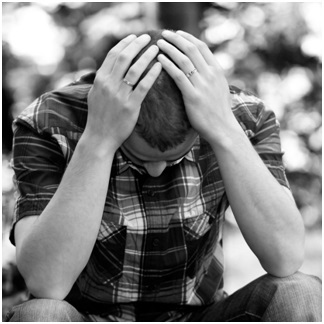Infertility and Depression Don’t Have to Go Hand in Hand
 There is no doubt that a diagnosis of infertility can lead to extreme stress and depression. In certain ways it is a vicious circle, because depression can lead to infertility, thus begging the question: what comes first, the chicken or the egg?
There is no doubt that a diagnosis of infertility can lead to extreme stress and depression. In certain ways it is a vicious circle, because depression can lead to infertility, thus begging the question: what comes first, the chicken or the egg?
Also, depression during pregnancy and after pregnancy (postpartum depression) is more common in women who have struggled with trying to conceive. However, there are important mechanisms to cope before the depression overwhelms you.
Know there is a difference between depression and sadness, so it is important to recognize the symptoms. Feelings of sadness generally dissipate fairly quickly. Depression on the other hand can affect your whole life – sleeping, eating, lethargy, etc. If left untreated, it can make your situation worse.
Understand that infertility is not just a female issue. Many men have physical issues as well that can adversely affect their sperm production. It is the emotional issues – particularly depression – we will talk about here.
Depression Can Affect Your Relationship
Infertility dramatically affects the relationship couples have with each other. Let’s admit it, sex on demand is no fun and all the testing and treatments can be exhausting. Females and males seem to react very differently. Women want to talk about it more and find a solution (see a doctor, think about adoption) quicker. Women often get more jealous around women who have babies and tend to avoid other pregnant women, baby showers, etc. Men tend to suffer more in silence. The feelings of guilt, shock, and anger by either party can cloud the relationship.
A recent Danish study found that infertile couples are three times more likely to divorce than fertile ones, and many women stayed single for 12 years or longer. The main thing with infertile couples is to keep the lines of communication open and seek treatment, either through changes in lifestyle, medication, or counseling.
 You Are Not Alone
You Are Not Alone
Infertility is a common condition that affects one in eight couples or 7.3 million people in the United States.It is even more common among African Americans – approximately 11.5% of black women report being infertility compared to 7% of white women.
Research has shown that women with infertility have the same levels of anxiety and depression as do women with cancer, heart disease and HIV+ status. Let’s admit it, procreation is one of the strongest instincts in the animal kingdom. Society puts a lot of pressure on couples to have babies, as if not having them is selfish.
Infertility can be very lonely and isolating because couples with children or even your family and friends do not understand the frustration. Or, they are just tired of hearing you talk about it, telling you to “quit obsessing on it”, “just get over it”, or “relax about it.”
Signs of depression may include:
• Feelings of isolation, hopelessness, or unhappiness
• Loss of pleasure in activities that were once enjoyed
• Anger over small matters
• Chronic irritability and mood swings
• Lethargy and lack of energy
• Slowed thinking, speaking, or body movements
• Frequent sleeping or insomnia
• Change in eating habits including overeating or undereating
• Excessive worrying
• Thoughts of suicide or self-harm (contact your doctor or 911 immediately)
Some hormonal imbalances that cause infertility may also contribute to mood symptoms and vulnerability to depression. Be sure to talk to your doctor if you are feeling symptoms of depression.
Getting Help
Many couples are hesitant to seek treatment, erroneously thinking it is something that will pass or you should learn to deal with it. This couldn’t be farther from the truth! Here are some suggestions for combating your feelings of depression or stress:
• Medications. Although some anti-depressants cannot be taken while you are trying to conceive, others are safe. Check with your ob/gyn or infertility doctor.
• Support groups.Support groups are an invaluable resource to talk to people who are going through the same things. Click here to get a list in your area.
• Individual/couples therapy. Do not expect your partner to feel the same way you do as men and women, or even other women or men, cope differently. Sometimes it helps to discuss your feelings with a more objective person such as a psychiatrist or psychologist who can teach you some positive coping strategies.
• Mind/body groupsuse both physical and psychological techniques to promote relaxation. Mind techniques include reframing negative emotions (called cognitive restructuring) and self-nurturing skills. Instead of saying “I will never get pregnant”, you use phrases like “I hope I can get pregnant.” Yoga and meditation are often taught to help you unwind.
Be sure to talk to your fertility doctor because a slight change in your fertility medications may make a big difference in your moods.
My best advice? Give yourself permission to be distraught. If you want to rant and rave when you receive a baby announcement, go for it. It helps to release the emotions. What’s important is to get help … just don’t sit there and stew forever, mired in your depression!
About The Author
Jeffrey A. Kasky, Esq. is a Florida adoption lawyer and Vice President of One World Adoption Services, Inc., a Florida-licensed not-for-profit child placing agency. Jeff’s diverse career experiences include co-authoring the book, “99 Things You Wish You Knew Before … Choosing Adoption” with Robert A. Kasky, Florida-certified law enforcement officer, and involvement in the autism community, including a TV show focused on helping families with legal issues related to autism called “Spectrum at Law” on The Autism Channel. A practicing attorney since 1995, he has worked on more than one thousand adoption cases.
 Lawyers To The Rescue Blog
Lawyers To The Rescue Blog

